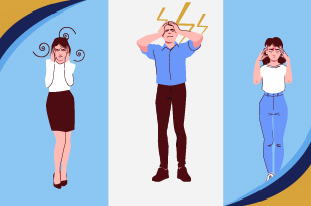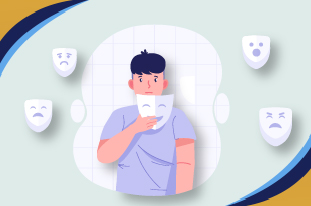A trauma bond is a strong emotional connection that forms between two people, often in unhealthy or abusive relationships. It can be really hard to let go of these relationships, even when we know they’re toxic.
This blog post will explore:
- What trauma bonds are
- Why they form
- Signs of withdrawal when breaking free
- How to manage these trauma bond symptoms
- How to break a trauma bond
- how to get out of trauma bond
Understanding trauma bonds can be the first step toward healing for anyone who has been in an abusive relationship or knows someone who has.
What Is a Trauma Bond?
A trauma bond is a powerful emotional connection that forms between a person and their abuser. The abuser often manipulates the relationship by controlling, isolating, or threatening the victim. This makes it extremely difficult for the victim to leave, even when they recognize the harm in the relationship.
Read More: Understanding The Different Types Of Trauma
Why Do Trauma Bonds Form?
Trauma bonds often form in relationships where there are cycles of abuse and apologies. The abuser might say sorry, buy gifts, or express love, creating a confusing mix of positive and negative emotions. This makes it difficult for the victim to leave, even though they know the relationship is harmful.
Here are some factors that contribute to the formation of trauma bonds:
- Intermittent Reinforcement: The constant shift between kindness and cruelty in an abusive relationship can create a powerful psychological addiction. This inconsistency makes it difficult for the victim to break free, as they are constantly hoping for the return of the loving behavior.
- Low Self-Esteem: People with low self-esteem may be more susceptible to trauma bonds. They might believe they don’t deserve better and may stay in harmful relationships, thinking they can’t do any better.
- Dependency: People who either rely entirely on a partner’s financial or emotional support may have no choice but to tolerate abuse from their partners.
- Hope for Change: Hope that the abuser will change or simply get better is what keeps so many people in the abusive connection, even in the face of multiple acts of violence.
This complex mix of emotions and psychological factors creates a powerful emotional bond that feels real, even if the relationship is harmful. This bond can be challenging to recognize and even more complex to break.

Trauma Bond Withdrawal: The Process of Breaking Free
Breaking free from a trauma bond can be a challenging process, similar to overcoming an addiction. The cyclical nature of the abusive relationship can create a strong dependence, making it difficult to let go.
Read More: Trauma Brain Vs Normal Brain: How Trauma Affects The Way We Live
Typical Symptoms Of Withdrawal Of Trauma Bonds
Stress and anxiety associated with the escape from a trauma-bonded relationship are natural and, if not well-managed, lead to all sorts of effects on one’s physical, emotional, and psychological selves. Here are some of the most common trauma-bonding symptoms people experience:
-
Intense Cravings to Return
It’s common for everyone to have an intense desire to talk to the ex or return to the relationship. They have this craving, and it looks like an emotional necessity even though deep inside, they understand it is bad for them.
-
Anxiety and Restlessness
One of the common withdrawal signs is anxiety, mainly where the involved partners use the other as a source of emotional support. People with GAD often experience anxiety most of the time and cannot quickly get relief by breaking a trauma bond.
-
Depression and Sadness
Breaking free from a trauma bond can lead to feelings of sadness, hopelessness, and even depression, bipolar disorder, acute stress, specific phobia, trauma, ADHD, and MDD. In some cases, it might trigger perinatal anxiety and depression (PANDAS) in new mothers.
Physical Symptoms
Read More: Understanding Relational Trauma
-
Self-Doubt and Guilt
Many feel guilty, wondering if they should have left and if they had the right to do so. They may regret their decision, asking themselves whether they overdid it or should have hesitated and stayed longer.
-
Low Self-Worth and Shame
Trauma bonds often involve abuse and manipulation, which can lead to feelings of shame and inadequacy. These feelings can intensify after the relationship ends.
-
Memory Distortions
People who have been in trauma bonds may selectively remember the positive moments and forget the negative ones. This can lead to a distorted view of the relationship, making it difficult to let go and move on.
Trauma Bond Withdrawal: Helpful Tips
It is possible and expected to take your time to process everything and recover from trauma bonding. Here are some of the ways that you can quickly deal with withdrawal symptoms of trauma bonding addiction and for you to have a healthy future.
-
Seek Support
It is not easy to free yourself from a trauma bond, but people’s help can support a lot: friends, relatives, or coordinators of support groups. Telling someone close gets your thoughts and emotions off your chest and brings you back to reality as to who you are.
- Support Groups: Another way is becoming a member of a trauma bond recovery or abuse survivor group, as it makes you feel that they are with you and get what you have been through.
- Therapists or Counselors: It is always helpful to reach out to an expert in the mental field since they will ensure the client gets to work on eliminating or even reducing the withdrawal symptoms, including guilt, shame, and doubt.
-
Make Use of Diaries to Record Personal Emotions and Activity Gains
Thinking in a written form is one of the most effective forms of self-therapy and introspection. Taking the time to express yourself and identify the symptoms of a trauma bond and patterns that may cause the crisis saves the day and documents your progress.
- Track Withdrawal Symptoms: You should record any feelings you experience and your physical condition. Circulating these can help you gain some objectivity and help you see specific markers over time.
- Write Letters to Yourself: It is always helpful to write letters telling yourself why you left. All the frustrations, hurt, and betrayals are valid. Read these when you’re tempted to return.
-
Practice Self-Care
Treating oneself, particularly in withdrawal symptoms, can go a long way in helping negate the symptoms. Caring for your body also assists in regaining one’s self-worth and makes one feel they are on their own.
- Regular Exercise: Exercise can lessen anxiety, improve mood, and alleviate some of the physical signs of withdrawal.
- Healthy Nutrition: If you eat a balanced diet, you feel more energy and grounded than the other foods you take.
- Mindfulness and Meditation: By using different methods such as meditation or other forms of mindfulness, such as deep breathing or engaging in groundings, one can minimize anxiety and emotional binging.
Read More: The Hidden Mental Scars of Childhood Trauma in Adults
Challenge Negative Thoughts
Trauma bonds give people feelings of worthlessness and the fact that they do not deserve more than they have. In doing so, they are free from these mental confinements, which are negative thought patterns.
- Affirmations: Self-approval can be helpful in the reconstruction of self-image. For instance, when one is overwhelmed with self-doubt, affirmations such as, “I am deserving of love and respect” or “Leaving was the right thing to do” will help.
- Cognitive Behavioral Therapy (CBT): When engaged with a CBT therapist, the person is assisted in recognizing time thoughts promoting undesirable behaviors and developing beliefs to replace them.
-
Start a new life & create distance
If possible, avoid contact with the person you were trauma-bonded with, as it will only lead to more heartache. This entails refraining from their friendly social networks, calls, or any other contact that may bring back those feelings.
-
Learn how to change old habits with new habits
People get attached to partners who inflicted trauma on them, making such relationships to become normative in the lives of individuals. Other healthy habits to practice when attempting to stop thinking about an ex-partner are new and positive, which can help fill the void.
- Create a new routine: Take the time you invested in the relationship and do something productive and constructive; it could be taking a class, getting a new hobby, or hanging out with friends who are encouraging.
- Celebrate Small Wins: Each time you keep yourself from signaling or thinking about unpleasant sensations, remember your success.
-
Focus on Future Goals
Giving people a future to look forward to is a positive way of helping them get through life. Establishing goals on the personal level, whether career or individual (or leisure), enables you to move from concentrating on the past to the present and, definitely, to the future.
- Vision Board: Use a vision board to see and become motivated toward what you want to achieve. It’s a way to keep your concentration on creating the life you want and deserve, a life that encompasses your values.
- Daily Reflection: Before you end your day, find it helpful to pause a little and appreciate the effort and desire to change.
Read More: What Is The Story Behind People Pleasing Trauma Response
Conclusion: The Path to Recovery
It is always hard to break a trauma bond, but experiencing withdrawal symptoms and thinking of how to deal with them is a sign of profound healing. Remember that the path in question is not linear; your process will have highs and lows. But with every journey you make, you are trying to regain the worth, freedom, and joy in your life. Love all that is being given to you, be kind, accept that you are healing, and never lose faith in yourself. It is possible to heal, and there is life after the trauma bond. You can now put an end to your search on how to break a trauma bond.
If you are looking for a reliable telehealth mental health platform to overcome the signs of trauma bond withdrawal signs, then don’t hesitate to get in touch with.
























